Have you ever walked into a room and been greeted by a distinct smell that’s hard to pinpoint but immediately recognizable as cat-related?
That is likely the infamous cat spray odor, a scent mark that felines leave behind to communicate with each other. (1)
While it’s a natural part of feline behavior, it can be quite a shock to humans due to its strong, musky smell. Some liken the scent to ammonia or rotten eggs, but it varies depending on a cat’s diet and overall health.
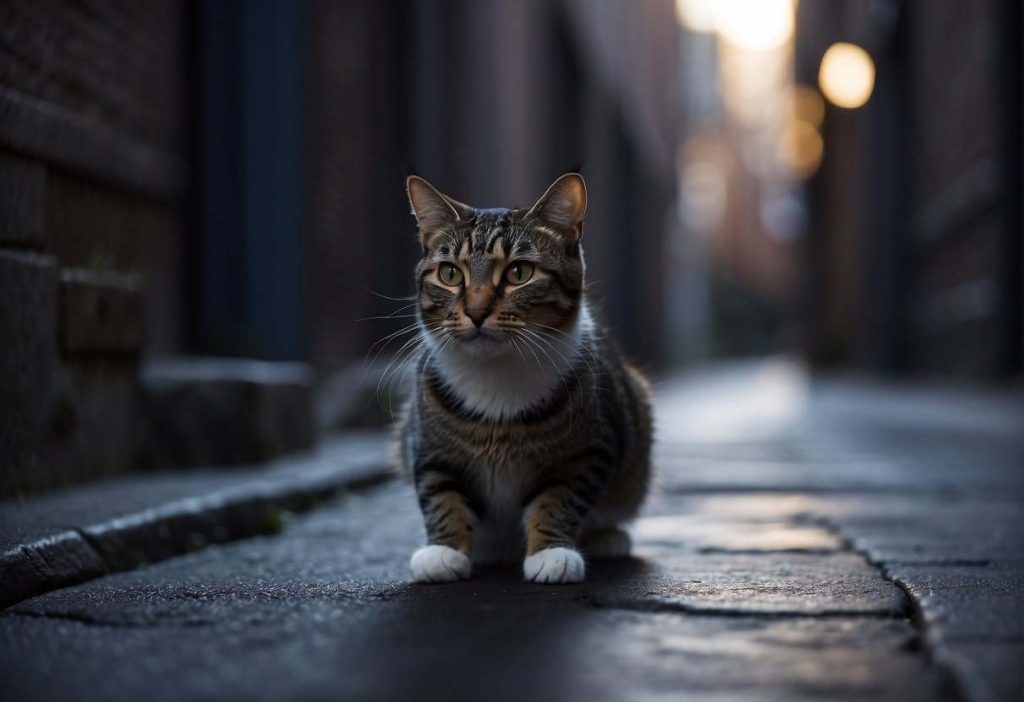
Understanding this behavior is crucial, not just for odor management, but for the well-being of our feline friends.
It’s a clear indicator of their emotional or territorial issues, and decoding it can help strengthen the bond between you and your cat. (2)
Getting a handle on the ‘whys’ of cat spraying means diving into their world, giving us insights on how to address the issue in ways that keep them healthy and happy within our shared spaces.
As many cat owners have shared on Reddit, dealing with cat spraying is a common experience, and seeking advice from fellow feline parents can help find solutions.
Key Takeaways
- Cat spray has a strong, musky scent that varies from one cat to another.
- Recognizing spray patterns is vital for addressing behavioral issues and maintaining a clean environment.
- Addressing the reasons behind spraying can strengthen your relationship with your cat.
Understanding, What Does Cat Spray Smell Like?
Ever wondered why your feline friend sometimes leaves behind a scent that’s well, not exactly roses and peonies?
It’s called cat spraying, and it’s a crucial part of kitty communication. Let’s get to the bottom of this, shall we?
What Is Cat Spraying?
Hmm, what’s that strong scent? If you’re a cat owner, you might be familiar with the musky, pungent aroma that results from your cat’s spray.
Unlike regular urination, cat spraying is a behavioral display linked with marking territory. Cats have scent glands in their cheeks, paws, and at the base of their tails.
When they spray, they’re saying “This place is mine!” But, how does this spray, which has a distinct odor similar to cat urine, get its telltale smell? (3)
The Composition of Cat Spray
The secret is in the volatile compounds. Cat spray is laced with pheromones, which are like feline fingerprints, utterly unique to each kitty.
Think of them as a Facebook status update but for cats. Additionally, ammonia is part of the not-so-sweet perfume, contributing to that strong, sharp odor we associate with a cat’s mark of territory.
Here’s a quick look at what we’re dealing with:
- Pheromones: Personal ID tags in the scent world.
- Ammonia: The sharp, kick-up-your-nose essence.
- Musk: The base note of your cat’s natural fragrance.
Wading through the aroma of cat spray in your home can be less than pleasant.
It’s their way to communicate—albeit a smelly one—with other felines, signaling everything from availability to mate to a firm “Keep out” message.
Cats, being the complex creatures they are, also have fancy versions of this spray: pheromone sprays.
These can be harnessed in products to calm your cat or dissuade them from redecorating your walls with their tags.
Embracing this stinky fact can be tough, but remember, when your cat sprays, it’s just them being the territorial, majestic little beasts they are.
It’s not personal, it’s just their way of navigating the feline social network!
The Behavioral Science Behind Spraying
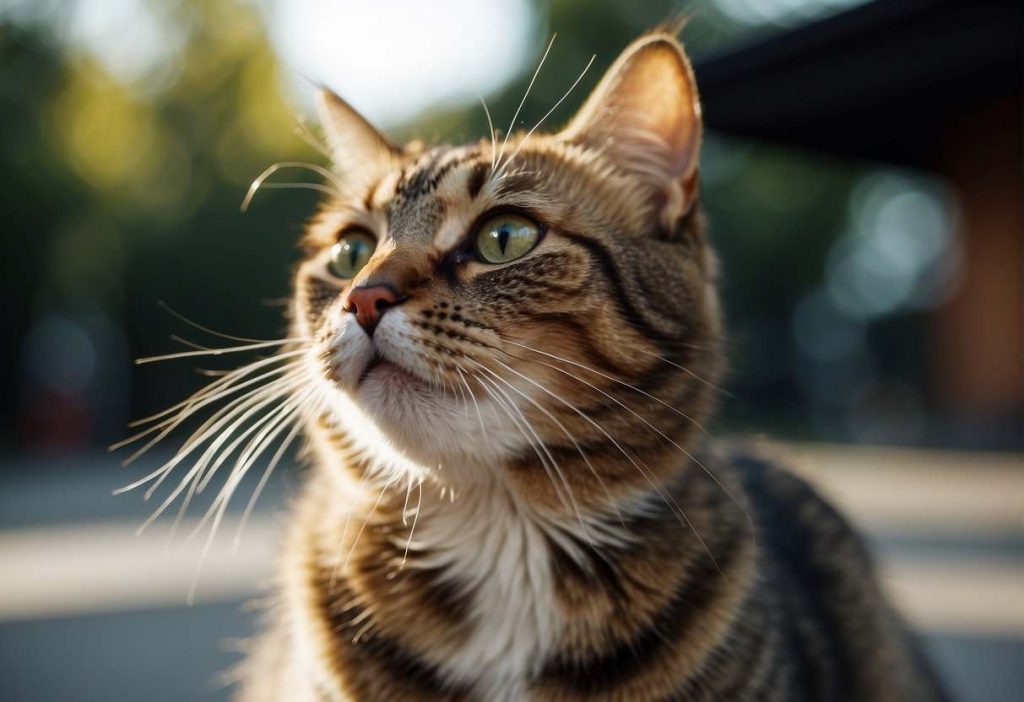
Why Do Cats Spray? Spraying, or urine marking, is a form of non-verbal communication.
Cats spray to convey information such as their reproductive status or to assert dominance, which is especially common during mating season. It’s sort of like a Facebook status update but for cats.
- Stress Factors: Just like you might stress-eat a tub of ice cream, cats have their stress responses. Moving to a new place or the arrival of a new pet might cause your cat to spray as a way to cope with anxiety.
- Territorial Markings: Cats are natural-born landlords, claiming their territory with a spritz. This behavioral marking helps them establish control and fend off any potential feline squatters.
Turning Off the Spray Creating a stable environment, where your kitty feels comfortable and relaxed, can significantly reduce spraying behaviors. Here’s a quick checklist:
- Reduce Stress: Keep those zen vibes flowing and maintain a consistent routine.
- Provide Resources: Ensure there are plenty of toys, scratching posts, and safe spaces.
- Clean Up: Keeping the home clean can discourage the need to re-mark.
Remember, spraying is a natural behavior for cats; it’s their way of texting the neighborhood about their feelings. (4)
Understanding these underlying motivations can help you keep your cat happy and your home smelling fresh.
Deepening the Cat-Owner Connection
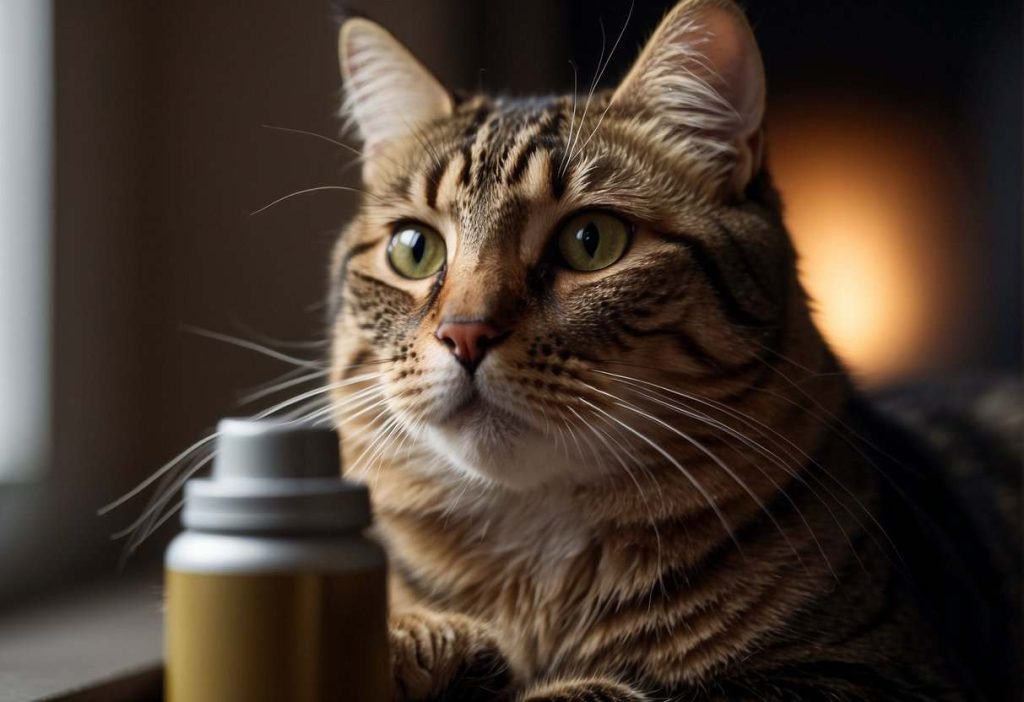
Understanding Your Cat’s Language
Cats speak in subtle ways and spraying might be their form of expression, especially when they’re experiencing health issues or stress. Pay attention to:
- Body Language: Are they crouched, twitching the tip of their tail?
- Vocalizations: Is your cat’s meow more persistent, louder, or more urgent than usual? (5)
Both can indicate stress or potential medical issues, such as a urinary tract infection (UTI). A quick response can deepen your connection as your cat feels understood and cared for.
Spot the Signs:
Identifying health issues early can prevent spraying related to medical conditions. Look out for:
- Frequent attempts to urinate with little result
- Discomfort while in the litter box
- Unusual licking of their urinary area
These can be signs of a UTI or other health problems. Your vet can offer the best guidance here – don’t hesitate to make an appointment.
Nurturing a Positive Relationship
Your response to spraying is key to a healthy relationship. Consider:
- Stress Reduction: Create a cat-friendly environment to reduce anxiety.
- Positive Reinforcement: Reward your cat for using the litter box.
- Bonding Activities: Invest time in play; it’s not just fun, but it’s bonding!
Check out these bonding activities:
- Interactive toys
- Gentle grooming sessions
- Puzzle boxes for mental stimulation
This positive attention decreases the chances of stress-induced spraying and reinforces good behavior. Remember, you’re building trust, the core of your relationship with your feline friend! (6)
By changing how you respond to spraying, you’re not just dealing with an unpleasant odor; you’re understanding and addressing your cat’s needs.
It’s a partnership, and when they’re happy and healthy, you’ll be the number one human in their life!
Addressing Cat Spraying with Practical Solutions
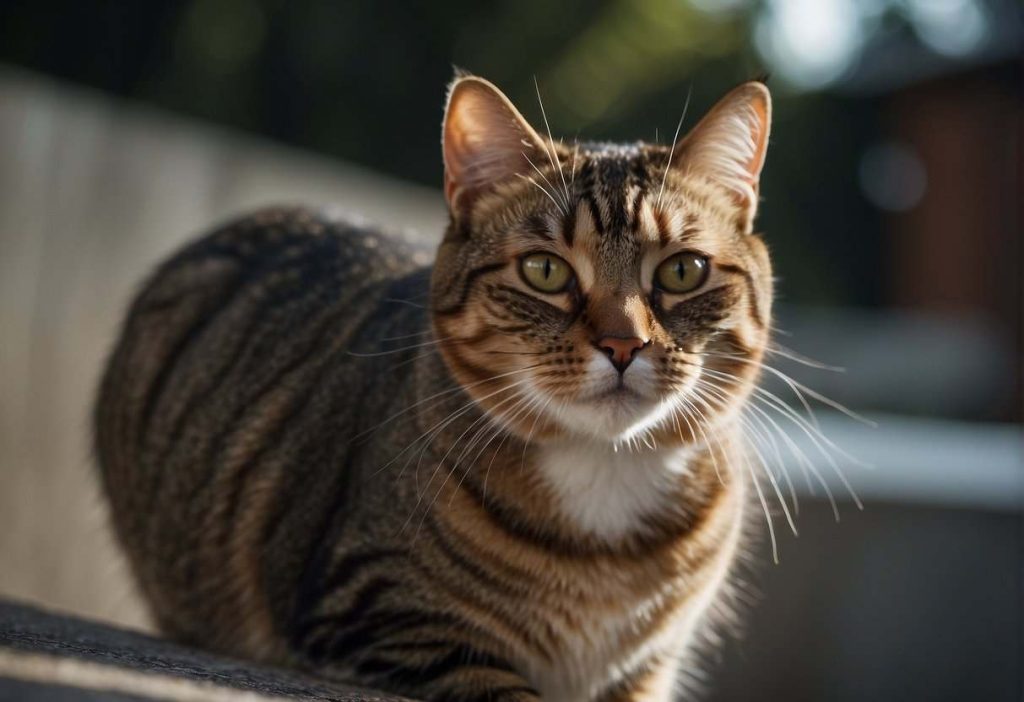
Let’s chat about tidying up and putting a stop to this funky feline behavior.
Freshening up the Scene: Cat spray’s got that musky kick, huh? No worries, let’s zip through the cleanup:
- Odor Eliminators: Enzymatic cleaners are your new best pals. They break down the smell at its source, so it doesn’t come back to haunt you.
- DIY Mix: Mix equal parts water and vinegar, spritz, and wipe. It’s simple and surprisingly effective.
Behavioral Busters: Cats are creatures of habit, and spraying could be a sign of distress. Peek at these tips:
- Neuter or Spay: If your kitty isn’t fixed, chat with a veterinarian. Neutering can reduce spraying in about 90% of cases.
- Pheromone Sprays/Diffusers: Mimic those calming vibes with synthetic pheromones to ease kitty tension.
- Environmental Enrichment: Scratching posts, toys, and climbing spots can work wonders for a bored kitty.
Tailored Strategies: Every kitty’s an individual, so let’s think outside the litter box:
| Scenario | Solution |
| Multi-cat madness | Give each furball their own space, including litter boxes and beds. |
| Stubborn spritzers | Consult an animal behavior consultant for personalized advice. |
Got a curious cat that loves your sofa’s new scent?
Deterrents like citrus-based sprays discourage repeat offenses but should be used carefully (because we want happy, not grumpy, whiskers).
In a nutshell, block the spray, play the day away, and consult pros when in doubt. Stick with this, and your home will be as fresh as a daisy in no time!
Adding Humor and Relatability
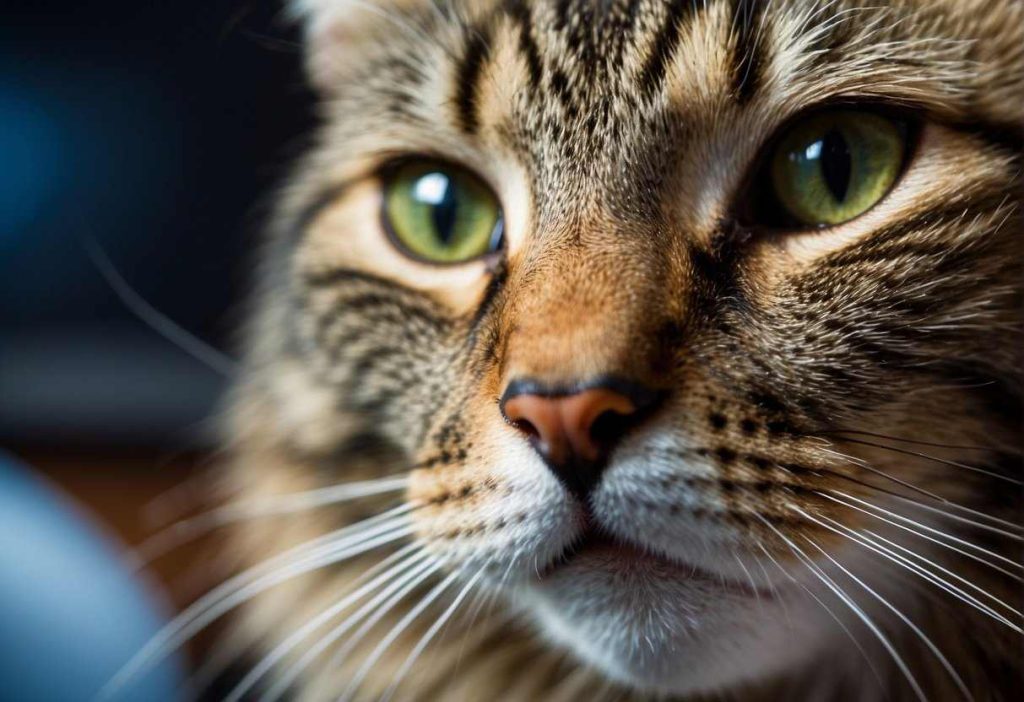
Cat spray it’s their less-than-pleasant signature scent, with a potency that could rival the stinkiest of artisanal cheeses. But fear not, fellow feline fanatics, there’s a playful side to this pungent puzzle!
So you’ve detected the distinct ambiance of cat spray—congratulations, your nose is in working order!
It’s like stumbling upon a secret message, only it’s written in an odor only your cat is keen to read. Now, what can you arm yourself with for this aromatic assault?
- Baking Soda: your fluffy friend’s kryptonite for stink control.
- Vinegar: not just for salad dressings, but a trusty sidekick in neutralizing that tangy tang.
- Enzymatic Cleaners: the undercover agents that break down the mystery musk.
Let’s face it, urine for a bit of a cleaning spree. Get it? But with an arsenal of odor eliminators, the battle is half-won.
- List litter box clean-ups as your daily “me-time”.
- Surprise your cat with aluminum foil near their usual spray spots—a feline no-fly zone!
- Black or UV light can turn you into a detective on the hunt for the invisible evidence of urination escapades.
Remember, life with cats is like a box of… litter boxes. You never know what you’re gonna get, but there’s always a way to find the humor and sprinkle a little joy in the cleanup routine.
Share your ‘tail’ of olfactory woe and we’ll laugh (and clean) right along with you!
Ensuring Your Cat’s Health and Happiness
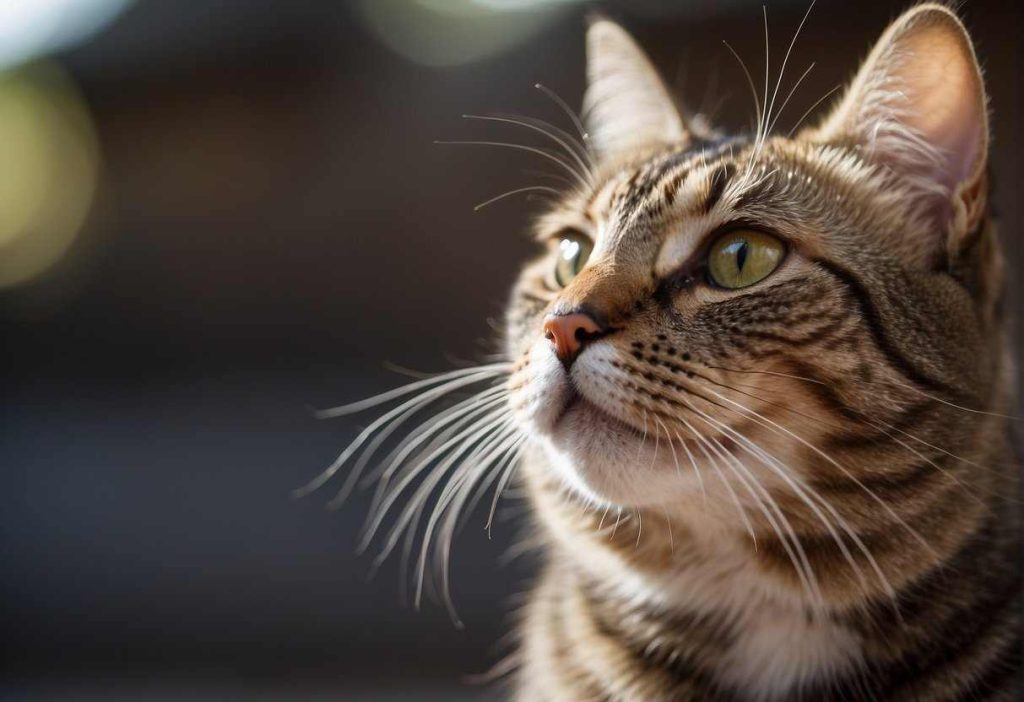
Cat sprays might signal dominance in a multi-cat household or be a way of marking their territory, it’s crucial to understand that sometimes spraying can be a cry for help.
Is your feline friend stressed or unwell? If they’re spraying more than usual, it could be their way of saying that something’s wrong. (7)
Cats can be quite secretive about pain or discomfort, but changes in behavior like increased spraying might be the red flag you need.
- When to consult your vet:
- Sudden onset of spraying
- Changes in the odor or color of the spray
- Other signs of distress or health issues
Supporting your cat’s well-being involves a few simple steps:
- Multi-cat dynamics: In households with more cats, the fur can really fly! Ensure that each cat has ample space and resources to prevent territorial disputes.
- Separate feeding areas
- Individual litter boxes
- Environmental enrichment: Keep your cats’ lives interesting and full of stimulation. This can help reduce stress and prevent the urge to spray.
- Scratching posts
- Toys and puzzles
If you’ve cleaned every surface and tried every trick, yet your cat continues to spray, it might be time to seek professional advice.
Unresolved spraying issues can diminish the quality of life for you and your cats, so don’t hesitate to reach out to a vet or a feline behaviorist.
Looking for more insights on feline behaviors? There are resources galore—from books written by animal behavior experts to online forums where you can share experiences and get advice from fellow cat lovers.
Remember, your priority is to provide a happy, stress-free environment for your furry companions. By doing so, you’re not only making them happier, but you’re also likely to reduce unwanted spraying.
Keep it playful, keep it peaceful, and keep those tails wagging!
Quick Recap
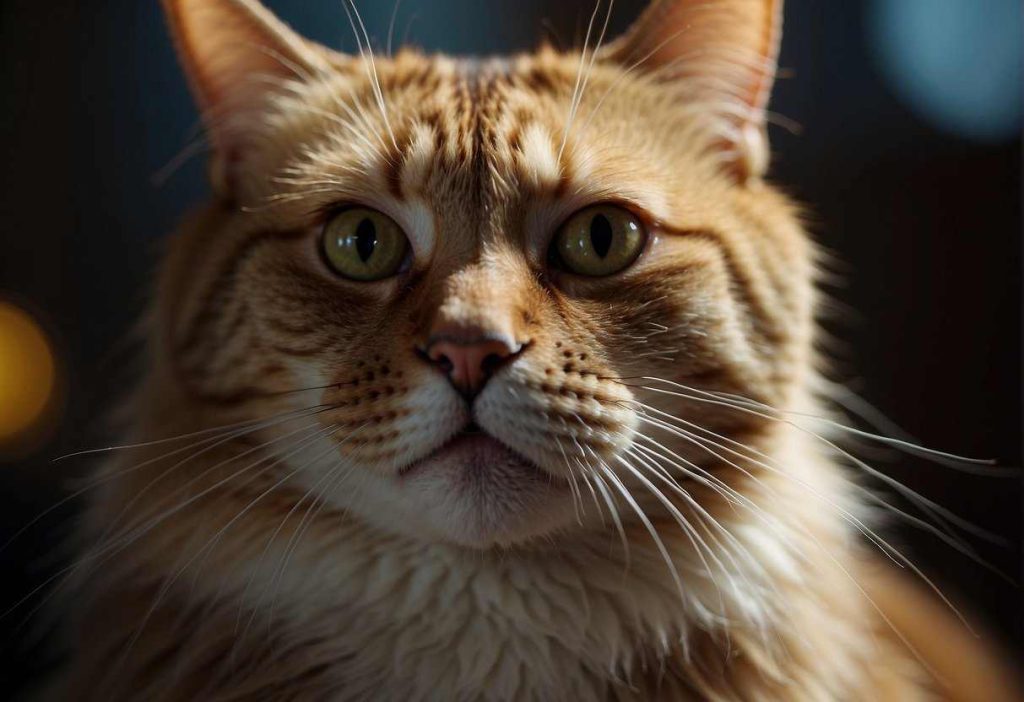
Why not tackle the spray-smirk-inducing problem with humor and patience? After all, you’re deciphering a secret code in “Eau de Cat”.. Here’s a bite-sized summary:
- What’s that Smell?: Cat spray has a distinctive, strong smell. It’s not just plain urine; it’s a signal to other cats, laced with additional chemicals.
- Musky Details: Expect a musky, pungent aroma, sometimes likened to ammonia or rotten eggs.
- Unique Factors: Like us, every cat is unique—so is their spray. Diet and health can tweak the stench.
Facing a spray predicament? Don’t fret:
- Solutions at Hand: Modern problems require modern solutions. Products like the Anti-Icky-Poo Enzyme Solution can work wonders.
- The Natural Way: If you lean green, natural remedies like lemon or orange oil in your cat’s water could help turn their spray scent citrus.
Remember, you’re not alone on this scented journey. It’s just another part of the cat-owner story.
Ultimately, loving your whiskered companion comes with both snuggles and challenges. Stay curious, stay learning, and let’s continue to share this quirky, smelly, but fundamentally rewarding path of cat ownership.
Frequently Asked Questions
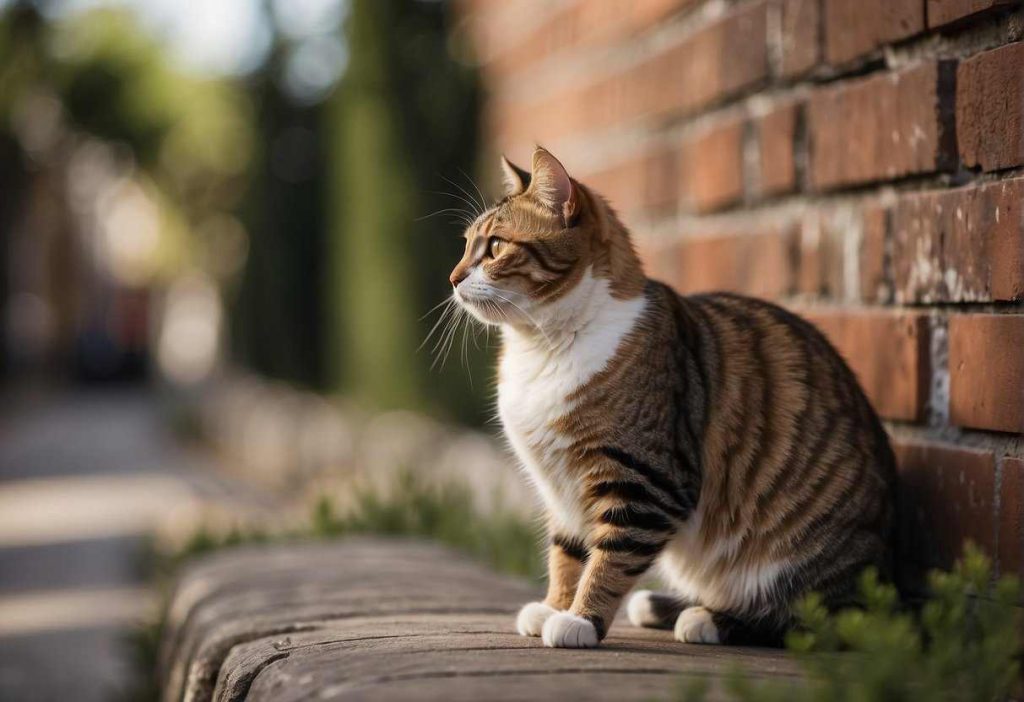
Cat spraying is a behavior that tends to confuse and frustrate many pet owners. In this section, we address some of the most common inquiries associated with this feline behavior.
What exactly causes a cat to start spraying?
Cats spray to mark their territory and communicate with other cats. Unneutered male cats are the most frequent culprits, but females spray too, especially if they’re in heat.
How can I tell if my cat is spraying due to stress?
You might notice your cat spraying in response to changes in the home, new pets, or alterations in their routine.
Stress-induced spraying often accompanies other signs of anxiety such as hiding or excessive grooming.
Does neutering or spaying my cat prevent spraying?
Neutering or spaying can significantly reduce your cat’s urge to spray. Most cats stop spraying within six months of being neutered or spayed.
What’s the best way to clean up cat spray to prevent re-marking?
Cleaning up cat spray promptly with an enzymatic cleaner is the best way to prevent re-marking. These cleaners break down the urine, effectively neutralizing the odor.
Can changes in my home environment cause my cat to spray?
Absolutely! Cats spray in response to environmental stressors such as moving to a new house, renovating, or introducing a new pet or family member to the home.
How can I differentiate between spraying and medical issues like a UTI?
Spraying typically happens on vertical surfaces and is a behavioral issue, whereas urinary tract infections (UTIs) might cause improper elimination on horizontal surfaces and are accompanied by signs like frequent urination or blood in the urine.
If in doubt, a vet visit is a must.
- The Ultimate Overview to Actual Cash Gambling Establishments - July 1, 2025


